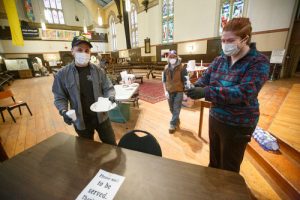Anglicans continue to do good work to care and advocate for the most vulnerable at this critical time.
While the COVID-19 pandemic has shuttered church buildings and cancelled services throughout the diocese, the work of the Church in caring for the poor and advocating on their behalf has become more urgent than ever.

The provincial government recognized the critical importance of outreach supports in its March 24 emergency order, providing that “businesses and other organizations that support the provision of food, shelter, safety or protection, and/or social services and other necessities of life to economically disadvantaged and other vulnerable individuals” were to be considered essential services.
Angie Hocking, head of outreach at Church of the Redeemer, Bloor Street was named as the diocesan point person for questions pertaining to front-line ministries during the pandemic. She swiftly moved to organize Zoom gatherings of clergy and lay outreach staff to identify issues of concern. A Facebook group for resource-sharing was set up and eventually expanded to welcome outreach workers from other faith-based organizations. Elin Goulden, the diocese’s Social Justice & Advocacy Consultant, created a diocesan policy that included best practices for outreach services.
While in a very few instances programs were suspended to protect the health of elderly and at-risk volunteers, a survey sent to parishes on March 16 found that more than 30 parishes in the diocese continued to offer their regular outreach programs, with adaptations to observe hygiene precautions and social distancing. Community meal programs distributed meals-to-go, and food banks admitted one client at a time and pre-packaged hampers where possible.
Loss of income has increased pressure on food banks and community meal programs. At Church of the Redeemer, the Common Table has gone from serving 80 to 120 meals per day. St. James’ Cathedral now serves lunch twice a week to meet the increased need. At the same time, many parishes have experienced an outpouring of community support. “For every volunteer we have lost because they have to self-isolate, three more have called asking how they can help,” reported the Rev. Tay Moss at Church of the Messiah, home of the Avenue Road Food Bank. At St. Stephen in-the-Fields, it was a similar story. “We’ve had amazing donations of food, money, community-made hand sanitizer, gloves, takeaway containers, and so many people sending us messages and coming in to help, it’s been almost overwhelming,” noted the Rev. Maggie Helwig. At St. Timothy, Agincourt, the Rev. Deacon Kathy Buligan found breakfast program volunteers “eager to participate” and the guests “happy to see we are still there for them.” From Mississauga to Cobourg, from Orillia to Peterborough, parishes continue to find ways to be there for those most in need.
For those who are homeless – already at increased risk due to the prevalence of underlying health conditions – social distancing is impossible while sleeping in overcrowded shelters and respite centres. Several parishes within Toronto initially offered space to the city to help reduce overcrowding in homeless shelters. However, as several cases of COVID-19 were identified in shelters and the province further reduced the number of people allowed to gather in one location, it became clear that the best option to safeguard the health of those who are homeless and those who assist them would be to provide hotel rooms to allow people to self-isolate. Other communities in the diocese, including Barrie and York Region, have already begun to take this approach. On March 30, Mayor John Tory announced the provision of 1,150 such units in Toronto, but with the total number of the city’s homeless estimated at 10 times that number, much more needs to be done. Bishop Andrew Asbil and the two Toronto area bishops, Bishop Kevin Robertson and Bishop Jenny Andison, wrote to Mayor Tory on March 31, urging the expedited provision of hotel rooms for all those experiencing homelessness.
At a press conference the same day, Bishop Robertson commented, “As we self-isolate in our own homes, there are thousands in our city forced to sleep in overcrowded shelters. The government is the only entity with the infrastructure and the financial resources to make this happen quickly. That’s why we, and other faith groups, are urging government to show strong leadership.”
The pandemic has exposed the inequalities in our society. It is clearer than ever that homelessness is a health crisis, and that many are on the brink of income and food insecurity. Yet the crisis has also galvanized communities to care and advocate for those most in need. There is hope that we will come through this, together.
Want to get involved? If you are interested in assisting the parishes that continue to offer community care during the pandemic, please contact Angie Hocking at hockinga@theredeemer.ca. To learn more about advocacy efforts in the diocese, contact Elin Goulden at egoulden@toronto.anglican.ca.